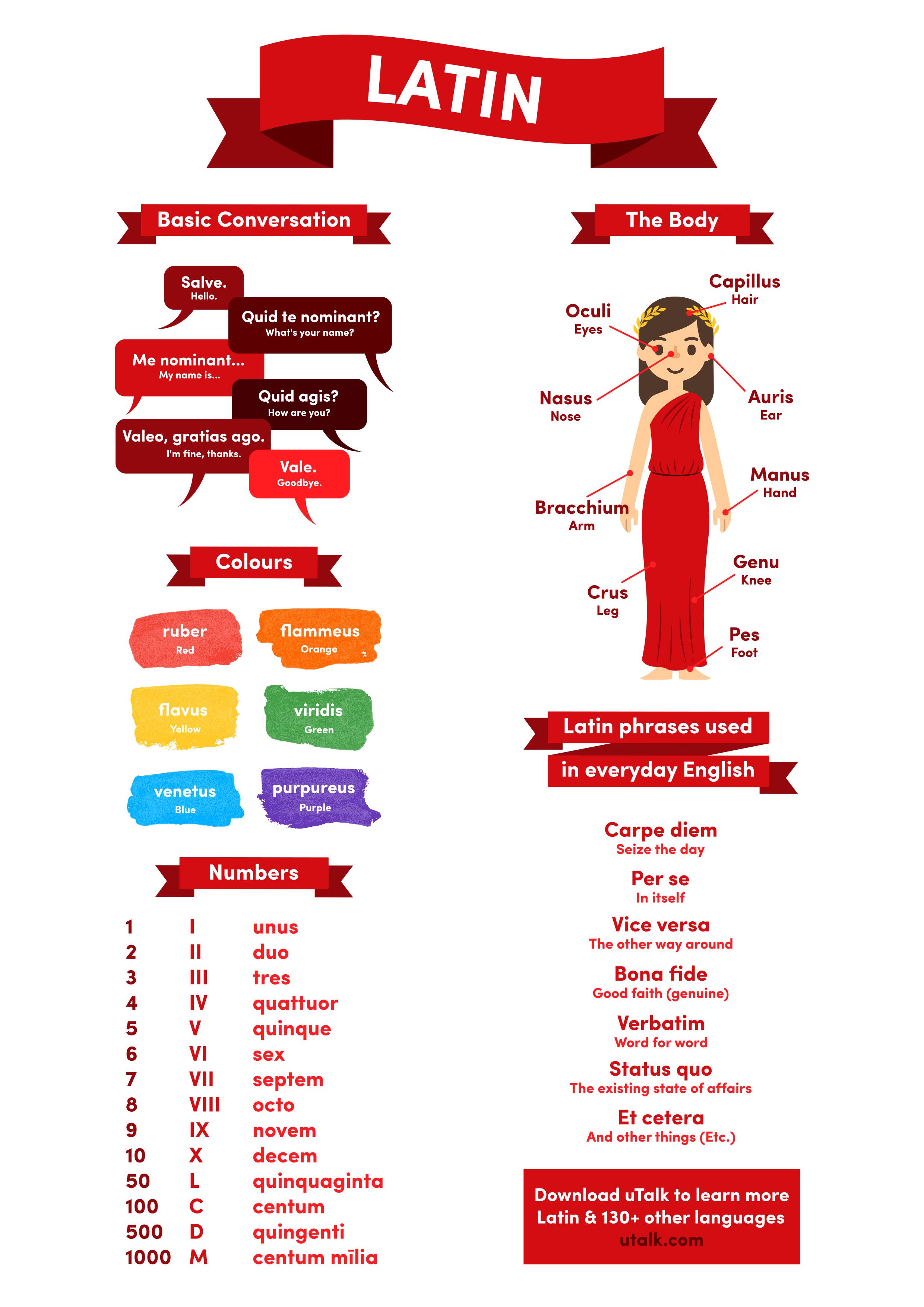Beginner’s guide to Latin
Last week, Latin became the 133rd language to be added to uTalk, our app for iPhone and iPad. (Don’t have an iOS device? You can also learn Latin on your computer.)
And to get you started with Latin, we’ve put together this beginner’s guide with a few essentials – some basic greetings, colours, numbers and parts of the body, along with some Latin phrases we still use in everyday English. As always, please feel free to share!
Embed This Image On Your Site (copy code below):
Let the cat out the bag…
The world has become slightly obsessed with cat videos and cat Instagram accounts (have you seen the video where cats see a cucumber? Trust me, it’s worth a watch). They are seriously cute! I am a massive cat lover and my phone is filled with photos of my cat, Marcella.
And when it comes to the English language, we love to use cats in idioms; you may find some are more difficult than others to guess the meaning of.
Here are some examples:
Has the cat got your tongue?
This basically means why are you being so quiet? Why aren’t you speaking? Sometimes associated with the idea that you’ve done something wrong and don’t know what to say to get out of the situation.
It’s raining cats and dogs
It’s raining (like it does A LOT in England) and it’s raining really hard.
Look what the cat dragged in
This is a very catty comment (see what I did there) this is said to someone when you don’t particularly like him or her. You’re making a point to say you don’t want them there in the same place as you.
There isn’t room to swing a cat
Okay I don’t know why you would want to swing a cat but this idiom means, it’s a really small space.
Put the cat among the pigeons
This is when you say something or do something that causes trouble. This could be expressing a different opinion to people in a group who all think the same thing.
Let the cat out of the bag
You’ve said something you shouldn’t have said, a secret maybe. You’ve said it to someone you shouldn’t have, which means you’ve essentially ‘let the cat out of the bag’.
The cat’s pyjamas/whiskers
This is an expression that means something is fabulous or excellent, similar to the ‘bee’s knees’.
If you have any other fun cat-related idioms (or any great cat videos to share with us), let us know!
Alex
Learning languages helps me help other people
Darren took part in our uTalk Challenge in January this year, choosing Polish, and he’s continued in February with Czech. Here’s his language learning story…
My name is Darren, I’m from Bath, England, and my language journey really began about 10 years ago.
I had studied French and German at school but I didn’t really enjoy them. I didn’t realise how useful languages could be until a friend asked me to help her learn some Latin for her nursing exam. She gave me the list of things she needed to learn with a look of sheer terror on her face and I told her ways to easily remember each word. You could see the panic in her eyes fade as she realised she could remember everything after just a couple of hours.

Soon after, I started working with a lot of Polish girls. It was quite difficult because only one or two of them could speak English, so I decided to try to learn enough Polish to be able to say “Good morning”, “You need to do this…”, “Would you like a coffee?” and other essential phrases. My first few attempts at communication were hilarious! My pronunciation was terrible and led to smiles and giggles, but they were all really impressed that I even tried and my blushes soon turned to grins of pride. I started doing the same when other new people arrived and was soon spouting phrases in Polish, Hungarian, Latvian, Romanian, and Greek. The look of happy surprise as a nervous new employee is greeted in his or her own tongue is itself worth the effort of learning.
I try to study a different language every day of the week for about two hours. Now I have friends from all over the world and teach English as a Second Language so I am lucky enough to be able to practise different languages every day. I’ve lost count of the number of times I have been able to help someone in the street when they have asked someone in broken English if they know where some place is, or in a shop when they don’t understand what is being said to them by a cashier. One time I was even asked to help translate for a friend who had been attacked and needed to talk to the police. Languages are now very important in my life and are my biggest passion.
One last thing: my original attempts at speaking Polish eventually led to me marrying the girl of my dreams. Just another reason to start your own language adventure!
Why learn Chinese Chengyu?
Today’s guest post is by Joe Paterson, a student at Keats School in China. Joe explains Chinese chengyu, which are absolutely fascinating and a perfect example of why we love languages so much – they’re all so unique and interesting. Do any Chinese speakers have more examples – or does the language you’re learning have an equivalent?
 Each language has its own idiomatic richness. English is full of proverbs, sayings and odd phrases like ‘Bob’s yer uncle’. Chinese is no exception. When you learn Chinese in China, you will definitely come across all kinds of interesting and creative ways of saying and expressing things. 土包子 (tubaozi/earth steamed-bun) means a country bumpkin or someone with backward or poor taste, and to wear 绿帽子 (lv maozi/ green cap) means to be cuckolded. But perhaps the most uniquely Chinese idioms are 成语 (chengyu).
Each language has its own idiomatic richness. English is full of proverbs, sayings and odd phrases like ‘Bob’s yer uncle’. Chinese is no exception. When you learn Chinese in China, you will definitely come across all kinds of interesting and creative ways of saying and expressing things. 土包子 (tubaozi/earth steamed-bun) means a country bumpkin or someone with backward or poor taste, and to wear 绿帽子 (lv maozi/ green cap) means to be cuckolded. But perhaps the most uniquely Chinese idioms are 成语 (chengyu).
Chengyu are four character phrases that can be thrown into daily conversation but will throw up a wealth of meaning and significance to the interlocutor. Some of these phrases seem quite bizarre without a context, but many have a background story which explains the meaning and also conjures up images that reinforce the word’s meaning.
The first chengyu we will look at is 东施效颦 (Dongshixiaopin/ Dong Shi effect frown). The literal translation is altogether puzzling but a native speaker would instantly know the meaning to be to imitate someone but have the opposite to the desired effect. It is only when we know the background story to the saying that we can fully comprehend it. The story goes that there was a beautiful girl named Xi Shi in the ancient Yue state who was admired by everyone in the village. However Dong Shi, another girl, was ugly and could never command attention. One day when Xi Shi fell ill she walked out of the door holding her hand to her breast, her face contorted in pain. All the villagers were concerned at her trouble and pain. Seeing this, Dong Shi attempted to imitate her mannerism. But when the villagers saw such a grotesque sight they were repulsed and ran away.
Nowadays people might use 东施效颦 to describe someone blindly imitating a pop star’s outfit, only to be ridiculed themselves for looking stupid. Or, someone plagiarising another’s business idea only to find themselves go bankrupt.
The second chengyu is 刻舟求剑 (ke zhou qiu jian/mark boat search sword) which means to pursue a goal despite changing circumstances that should be considered, or, in short, being stubborn in a foolish pursuit.
The phrase comes from a story where a man drops his beloved sword into a river. He marks the side of the boat to show where the sword fell in. Once at the shore he dives back in to find the sword but to no avail. Of course between marking the boat and getting to the shore the boat has moved downstream. An example of when his phrase could be used might be if someone insists in investing in a certain product even if research shows that the product might not sell.
Other phrases are not strictly chengyu but are made up in the same structure and used in daily speech, even though most people may not know the exact origin of the term.
乱七八糟 (luan qi ba zao/confusion seven eight pickle) is a word used to describe anything messy and unorganised, from a bedroom to the way in which someone does something. The phrase actually originates from a late Qing dynasty novel by Zeng Pu, in which he describes the way craftsmen used to keep their workshops in a 乱七八糟 state.
Many common chengyu may not have such an interesting background but serve to colour the language with images that are created by the visual characters themselves or their meaning. 自讨苦吃 (zi tao ku chi/ self ask for bitter eat) provides an image for the idea to ‘ask for trouble’ and 利欲熏心 (li yu xunxin/ profit desire smoke heart) would be the equivalent of the English phrase ‘blinded by greed’, but creates an interesting image of the desire for profit creating a vapour masking the heart.
The ability to use chengyu well is very much admired in China and so it is well worth trying to improve one’s own use and trying to learn more. After a while some chengyu become so natural to explain a certain scenario or situation that sometimes they even surpass one’s own mother tongue equivalent word or phrase. Taking a Chinese language course from a professional language school could help to establish one’s linguistic and cultural foundation to be able to understand and use chengyus in a versatile way.
Joe Paterson (Keats School)


